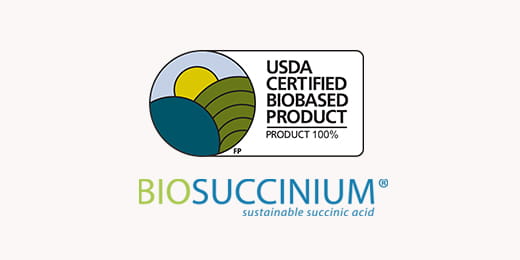Lestrem, FR (June 22, 2021) — Roquette announced today that it has earned the U.S. Department of Agriculture (USDA) Certified Biobased Product label. The product, BIOSUCCINIUM® succinic acid, is now able to display a unique USDA label that highlights its percentage of biobased content.
Third-party verification for a product's biobased content is administered through the USDA BioPreferred Program, an initiative created by the 2002 Farm Bill (and recently reauthorized by T 2018 Farm Bill). One of the goals of the BioPreferred Program is to increase the development, purchase and use of biobased products.
The USDA Certified Biobased Product label displays a product's biobased content, which is the portion of a product that comes from a renewable source, such as plant, animal, marine, or forestry feedstocks. Utilizing renewable, biobased materials displaces the need for non-renewable petroleum-based chemicals. Biobased products, through petroleum displacement, have played an increasingly important role in reducing greenhouse gas (GHG) emissions that exacerbate global climate change.
Biobased products are cost-comparative, readily available, and perform as well as or better than their conventional counterparts.
“We are very pleased to be part of this program. With this, we can bring the right value to our product and our customers, that will thus reinforce our leading position. This will bring us a step forward to the point of differentiation not only for the biodegradable plastic but also various coating applications.” said Franck Thumerel, Head of Performance Materials at Roquette.”
"We applaud Roquette for earning the USDA Certified Biobased Product label," said Vernell Thompson, USDA BioPreferred Program. "Products from Roquette are contributing to an ever-expanding marketplace that adds value to renewable agriculture commodities, creates jobs in rural communities, and decreases our reliance on petroleum."
According to a report that USDA released in July 2019, biobased products contributed $459 billion to the U.S. economy in 2016 (a 17% increase from 2014) and support, directly and indirectly, 4.6 million jobs. The report's research team estimates the reduction of fossil fuels and associated GHG emissions from biobased products equivalent to approximately 12 million metric tons of carbon dioxide (CO2) prevented as of 2016.
The increased production of renewable chemicals and biobased products contributes to the development and expansion of the U.S. bioeconomy - where society looks to agriculture for sustainable sources of fuel, energy, chemicals, and products.
Media Contacts
Roquette
Sophie Delannay
[email protected]
USDA BioPreferred® Program
Vernell Thompson
202.720.4145
[email protected]
More information
About Roquette
To learn more about us, please visit this page.
About BIOSUCCINIUM®
BIOSUCCINIUM® bio-succinic acid allows customers to choose a bio-based material with an improved environmental footprint to develop superior sustainable products such as polyurethanes for running shoes, automotive textiles and wheels, wood and furniture coatings; polybutylene succinate (PBS) for food packaging and plastic utensils; coating and composite resins; and many more.















